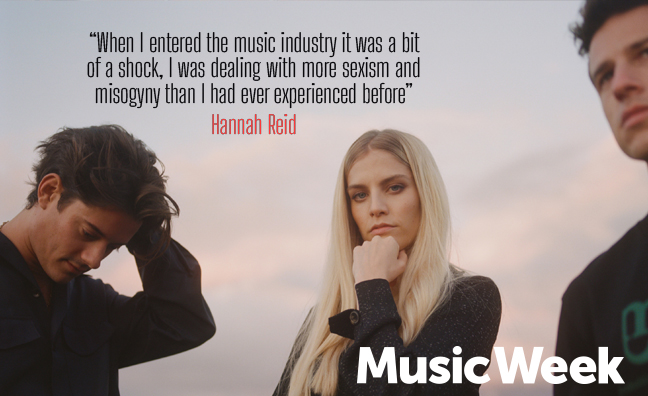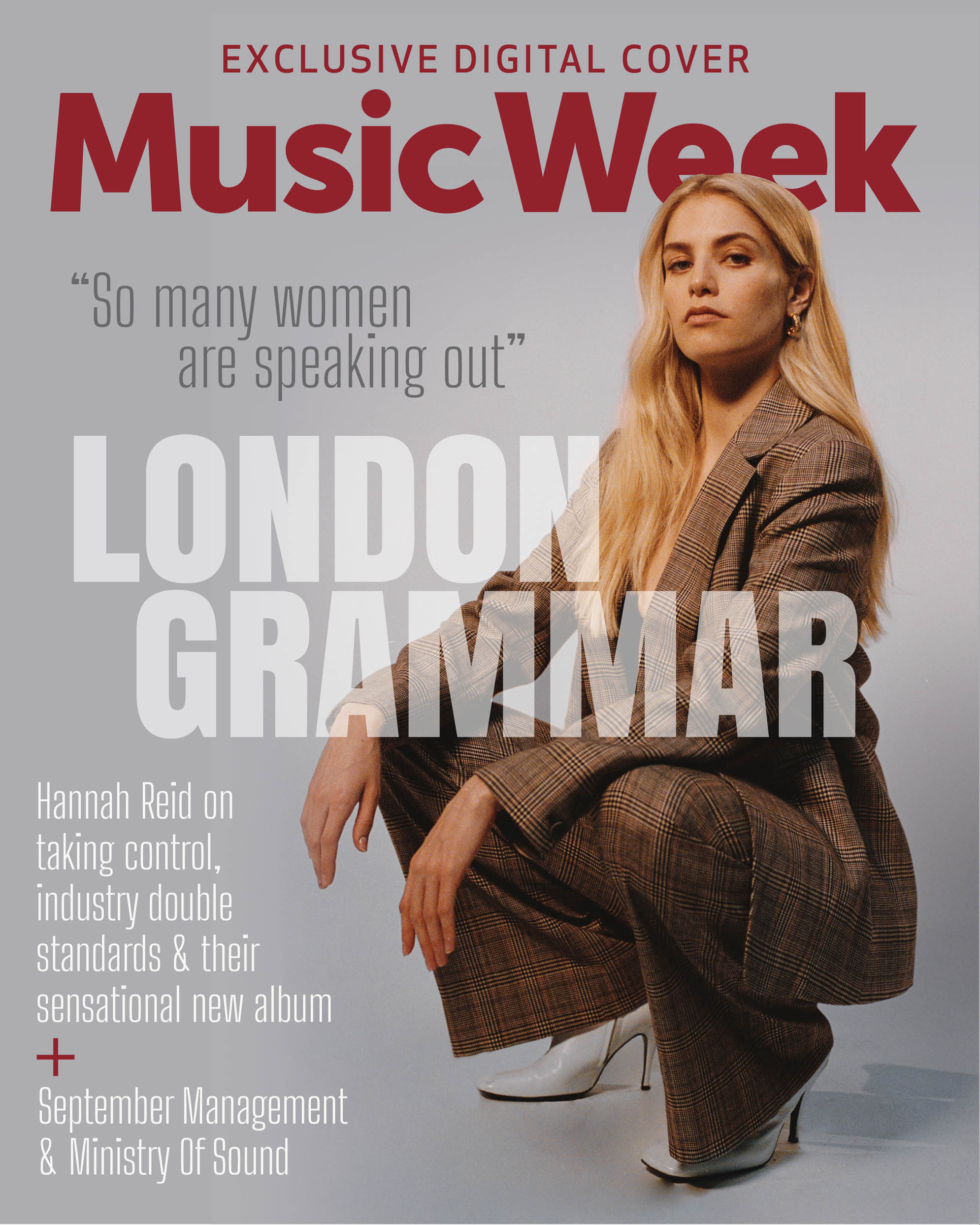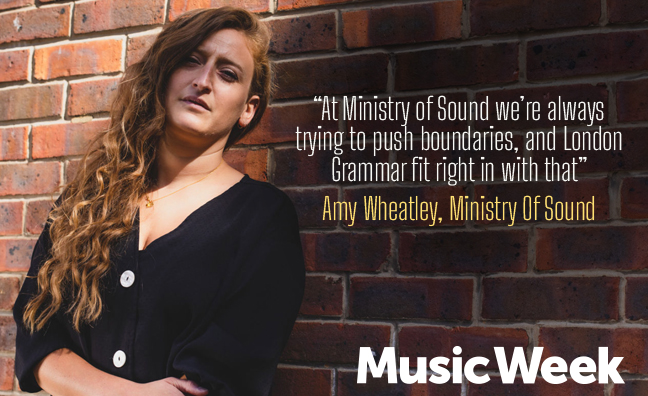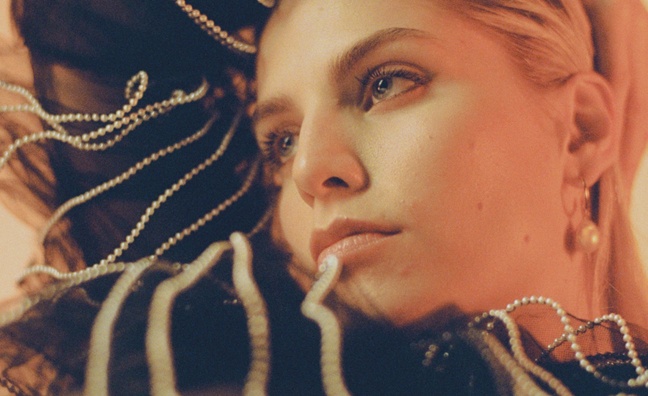Having topped the charts with their last album, London Grammar return with Californian Soil, a record that portrays this award-winning band in a new light, and turns the focus on ingrained inequality in the music industry. Music Week goes behind the sales figures and streaming numbers to hear the real story of London Grammar’s success. Joined by her bandmates, September Management and Ministry Of Sound, Hannah Reid, discusses feminism in music and gets to grips with becoming a pop icon…
Words: Anna Fielding
Photos: Crowns & Owls, Alex Waespi
It was, Hannah Reid of London Grammar decided, time to do things differently. She needed respect. She was tired of being told to look a certain way, of seeing her male bandmates treated with more seriousness. The only way around it was to start talking and to take charge. She spoke to the other London Grammar members, Dan Rothman and Dot Major, and stepped forward to lead the band for their third album, Californian Soil.
Released on April 16 via Ministry Of Sound, the album combines London Grammar’s characteristic mix of the sweeping and the intimate, but lyrically, Reid wanted to address the sexism she had encountered in the music industry. She had to make herself vulnerable in order to make herself powerful.
“It does convey a lot of pain for me,” she says. “And I think that’s a part of the kind of artist that I am. But I also wanted to convey change and positivity and empowerment, because this album has changed me fundamentally as a person. I am a lot stronger than I have ever been before, more confident in what I want to say.”
And London Grammar’s sprawling fanbase is ready to listen. Scrolling through their UK sales figures and streaming data shows the sheer scale this band is now operating at. Their 2013 debut album If You Wait hit No.2 and has 756,999 sales to date, according to the Official Charts Company. In 2017, Truth Is A Beautiful Thing (231,745 sales) went one better and hit No.1, selling more than 43,000 copies in its first week.
Increasingly, London Grammar’s streaming-friendly sound is hitting the sweet spot of maintaining growth between releases and the band saw a surge in Shazam activity thanks to various sync placements early last year, before any news of Californian Soil had dropped. They have 4,388,793 monthly listeners on Spotify, where their biggest song is Strong with 102,727,543 plays. Of their new tracks, Baby Its You is the best performer, with 15,382,613.

Reid, Major and Rothman have been friends for a long time. They began collaborating on music whilst at university in Nottingham. They were signed when they were “barely 20” as Major puts it. They have won several awards, including an Ivor Novello, played stadiums and festival main stages and had their songs used to soundtrack everything from prestige TV shows to high-end perfume adverts.
But away from the spotlight, things were much darker. From the beginning of their career, Reid has been portrayed as sensitive. In part this is because of the emotional nature of her lyrics and the otherworldly quality of her singing voice, but she’s also softly spoken and suffers from fibromyalgia, a condition that causes pain all over the body. She also has terrible stage fright and has spoken in the past about needing to sit down on stage to hide her trembling and of throwing up after gigs. But a relentless touring and promotional schedule had pushed all three members to a point where they felt things couldn’t continue as they were.
“We started working with them at the end of their first album campaign and they landed on our doorstep a bit broken,” says Rose Moon, general manager at September Management. “They were exhausted and overworked and just didn’t know who they were. So, instantly, my main focus was on rebuilding confidence and making them believe in them. Because they are an incredibly talented band.”
“They care so deeply about the artists they work with,” says Reid. “You have to be able to have absolute transparency and honesty. And that’s what we have with Jonathan and Rose.”
Moon agrees, describing the relationship as “professional, but with a lot of love.”
“At times, I feel very maternal and protective towards them,” she says. “I care a lot about them… But there is a professional boundary that remains because you have to be able to have difficult conversations with them and challenge them, and push them. But a core friendship is there. Ultimately, they're putting their trust in you to help guide their careers.”

The band began working with September Management seven years ago, and have continued on an upward trajectory, balancing staying true to themselves and innovating musically.
“At Ministry of Sound we’re always trying to push boundaries,” says Amy Wheatley, managing director of the band’s label. “And London Grammar fit right in with that, they cannot be pigeon-holed, they’re just unique.”
Wheatley also stresses the importance of transparency.
“It takes trust and takes time to build that trust, to make sure the band are getting what they need and want from the label,” she says. “I do think that on the whole, we've got a really good relationship between us and I feel like we can have honest conversations.”
Of the label, Reid says “I don’t think we would have been signed if it hadn’t been to an independent,” citing the longterm relationships she has with Wheatley and president Dipesh Parmar, who was an A&R when they first met.
Parmar is excited by the plans in place for the group.
“We want to continue to widen their fanbase as an act,” he says. “Selling out their UK tour in record time, including two Alexandra Palace dates really shows they are a force to be reckoned with. Of course, we would love to have a chart-topping UK album again. We have a strong base around key markets around Europe and Australia and we’re making inroads into the US, which is tough without touring and travel, but out big global marketing is underway.”
The president stops short of any bold claims about topping the charts, but there’s more than a hint of anticipation in his voice.
“I’d love for them to have another No.1,” says Parmar. “But our hopes for this album are for it to last for years to come and for more and more people to discover the band.”

Reid is speaking to Music Week, in classic pandemic fashion, from her home via Zoom. She is wearing a plain sweatshirt with her hair in a ponytail and has just handed her dog, Phoebe – named after the Friends character - over to a sitter so that she’s free to rehearse for the rest of the day. The band are beginning two weeks of practice for a livestreamed gig, on YouTube the Sunday after the album release and free for all fans.
If and when restrictions lift, the band will be back to playing live, with festival slots, including All Points East and a sold-out tour in November. Despite pushing back the release date of Californian Soil from September 2020, they have managed to stay in the public eye throughout the pandemic. Two singles from the new album, How Does It Feel and Lose Your Head, were released in the latter half of 2020, and videos for two more, America and Lord It’s A Feeling are currently being filmed. Parmar also notes that the band have built “a strong presence on TikTok” over recent months.
Although Reid had taken a leadership role, the making of Californian Soil was still very much a collaborative process.
“We experimented a lot more,” says Reid. “Working with just the three of us or in pairs. We completed it pre-Covid, so that was a creative decision to work that way. And because we’ve known each other for so long and we trust each other so much, we were able to do ridiculous things and I would think, ‘Well, thank God that’s not going to see the light of day!’. But then we would make something else afterwards and it would have elements of the ridiculous stuff we were doing before.”
Guitarist Rothman says he feels “incredibly proud” of the release.
“It was self-produced by us as a band,” he says. “The memories of spending summer days in my boiling hot loft studio, making the early demos of this album were some of the best days of my life.”
“For me Californian Soil is about the understanding we have between the three of us,” says multi-instrumentalist Major. “The relationship between us is stronger than it’s ever been and I’m so proud what both of the other two have achieved in the making of this record. Dan leading us through a hole in the ceiling of his closet into a secret attic when we hadn’t seen each other in six months was all the start we needed.”
A key moment of the past year, especially for Reid, was the inclusion of the Arty remix of their 2013 single Hey Now in the widely acclaimed BBC adaptation of Sally Rooney’s Normal People.
“It’s my favourite of all the remixes that have been done of our songs,” says Reid. “So that moment was quite an emotional one for me. We’d pushed the album back, we were stuck in the middle of a pandemic. So to have our music still resonate in that way, after so many years, and to then hear it on something so amazing as Normal People… I mean, I was like, ‘You know what? We can have longevity’. I think you live in fear, sometimes as a young band that you're going to get dropped, and that you're just going to die out. So to hear yourself on TV, it feels amazing, it feels like you're doing something right.”

For Reid, these different ways in which people approach their music are fundamental to the band’s success.
“I think as long as the emotion is at the core of it, then it can translate into different environments,” she says. “Songs will get remixed and get played in clubs in Ibiza and take on a life of their own. And then I also feel like the more intimate side means people will put on certain London Grammar songs to relax. But then we <also> have songs that translate really well at festivals. Provided we've got the correct slot, usually when the sun's going down.”
When the band do go back on the road, they will do so with a female tour manager, Carlina Gugliotta, who has also worked with Lizzo, Meghan Trainor and Adele.
“That was a really big change,” says Reid of their previous tour with Gugliotta. “The touring world is very male dominated, it’s not even specifically about men being sexist, it’s just a different balance of energy.”
She also talks about working with Manon Grandjean, now engineering with producer Fraser T Smith, and Ministry of Sound’s Wheatley (“we work with so many great ladies these days”). Reid says manager Rose Moon “is a total inspiration to me, the way she has handled herself in the industry, always being firm and fair, was inspirational.”
In turn, Moon says that she learned a great deal from another September artist, Adele: “Even though she’s younger than me and she was only 18 when we started working together, she has an amazing strength.”
“Hannah's definitely had a bit of a rough journey over the years,” says Moon. “She's not always the most assertive, maybe? I love her dearly and I just want to give her some form of confidence to help build herself and for her to believe in herself as an incredible singer, and songwriter, and musician.”
“I think Hannah being able to have a voice and have a platform to talk about it is really brave,” says Ministry’s Wheatley. “I think she says it so eloquently as well. Way more eloquently than I could.”
For Reid, these professional relationships with other women have helped her find her own strength.
“The message I got all the time was that I should be grateful to be where I was,” she says. “That I shouldn’t be ‘difficult’ and I ended up developing a complex about it, like ‘<am> I being difficult?’.”
“I think it took a little while to notice just how constant it was [for Hannah],” says Major. “From people always asking, ‘So, do you guys make the music and Hannah top lines it?’ all the time, to the subtle ways we’d be treated differently around the studio.”
Both Major and Rothman say they also wish they’d been able to speak up more and help their bandmate.
“That was mainly due to fear of doing so against someone more senior or more experienced” says Rothamn. “I feel guilty about that today. But it’s something I hope I have learned from.”
For Hannah Reid, now that she has started speaking out, she doesn’t intend to stop.

What does this album, Californian Soil, mean to you?
“I feel like this album has changed me as a person and it’s made me understand what a cathartic release really is.”
Do you mean releasing the album was cathartic, or that it was an emotional release?
“Both! Both! But mostly an emotional thing. I feel like I’ve put more vulnerability into this album, in some ways, than I have ever done before and I really pushed myself. It took quite a lot of bravery to do that.”
What was it that made you feel so vulnerable?
“I think of vulnerability and creativity as one and the same. I think with the first album I had that vulnerability, because you make a first album and you don’t know if anyone is going to hear it. Then on the second, I felt I was hiding behind my own lyrics, speaking about things in an overly poetic way. Whereas with this album I feel I’ve been able to be more direct about things that I’ve been through, things that I’m feeling. It took some work to get to that place and to feel okay about it.”
You’ve described this album as an explicitly feminist one. What was it that you wanted to say?
“I could speak about this subject for a long time. I definitely grew up in a bit of a bubble. So then when I entered the music industry it was a bit of a shock. I was dealing with so many micro-aggressions, sometimes on a daily basis, more sexism and misogyny than I had ever experienced before.
“I mean, of course I experienced the day-to-day crap that all women just have to put up with, but in the industry it was little things, small things, that actually added up to being quite a profound experience. It was extremely difficult to stand up to, because a lot of the time it’s kind of invisible and you can’t prove it’s happening.”
How did your male bandmates, Dan and Dot, see this?
“So, at the very beginning I don’t think they saw it. But then I also didn’t really see it myself. I would be, ‘Oh so that thing happened? Is that kind of weird? Why did that happen?’ or it would be, ‘Why does this person not like me?’ just after I’ve expressed a really strong opinion about something. Then once I understood it, I started to say to the boys, ‘Honestly, I think it’s because I’m a woman’. And now they can see it and reflect and so they support me in a whole new way, which is really great.”

How did the different treatment of you manifest itself?
“I think it’s important for me to say that nothing absolutely appalling happened to me, because there are so many women in the music industry who have experienced much worse than me. From the start I was called feisty. I was called difficult. It was acceptable for Dan and Dot to get angry. I always have this memory of being in a meeting with Dan very early on in our career and he got so angry that he came out in hives on his neck, all these red arches. And I totally agreed with him, but I remember coming away and feeling that if I had got that angry I knew just how those particular people would have responded.
“Then there were things about my image. It was blatantly discussed with me. I had to have an image. I remember one man, who I didn’t know, coming up to me after a gig and saying ‘I didn’t like what you were wearing. I don’t think it was you at all’. It never came up with the boys. And I don’t see why I shouldn’t wear a sparkly dress one day and jeans and a T-shirt the next.”
Do you think questions of image came up more because you were at the front singing, rather than being, say, a drummer or a bassist?
“I guess, yes, successful frontmen and women throughout history have had an image, but there’s also those that don’t. I was going to use Bono as an example, but that’s not right.”
How about Chris Martin?
“Yes, exactly. Chris Martin just goes on stage in a t-shirt and gets sweaty and everyone loves him for it.”
This is the world you work in. How does it feel to be calling out your own industry?
“At first, I was really scared. Then I felt guilty because, again, what I’ve experienced has been daily micro-aggressions, not anything absolutely traumatic. But I think it’s important to call out the small things too. I also feel that I’m not the only one, I feel so many women are speaking out.
“I feel it’s really amazing that there are so many younger female artists who have really moved feminism on and I am now learning from women who are younger than me. People like Billie Eilish, Lizzo, Miley Cyrus, Arlo Parks. I just feel they are women who are unapologetically themselves in every area, one part of them doesn’t cancel out another. That’s exciting. I mean, there have always been iconic women in the music industry, but maybe for me, at the time, I just felt a bit lost or disconnected from women.”
What do you mean by that?
“Well, I was isolated from other women in the music industry for so long because I was often the only woman in the room. I found it difficult to stand up to things because there was no one to do a sense check with. Whereas now we work with lots of ladies and I don’t feel disconnected any more. I don’t feel alone, basically. It’s difficult for men and women. As musicians we’re travelling around the world and we don’t often get to meet up with someone and say ‘Hey, do you experience this thing all the time?”
We’ve talked about feminism, but how much of the album is also about femininity?
“I’m very pleased you asked that, because one of the most fundamental things to me about being a woman in this industry was feeling quite exhausted from sometimes having to be strong… And I wasn't very firm and strong. But there needs to be a place for women like me in the music industry, and a place for women like me in the workplace. We often applaud women because they're fighters, which is amazing. And those women often have carved the path for loads of other women. But also for somebody like me, I found it so hard, because I wasn't that. I do believe my femininity is tied in with my vulnerability. That's who I am. And I hope that this album conveys that as well.
“I think men have the same difficulty. I think Dan and Dot are actually very, very sensitive men. And they then ended up probably feeling like, well, that side of themselves can't be celebrated. I'm sure lots of men would say that in the music industry, and maybe they've struggled with that as artists. We can lose such valuable things when we don't listen to the people who are the slightly quieter type.”
Do you consider yourself a role model?
“Oh no. I feel like all the female artists I love are role models for me. But I would love to think that there is someone out there that thinks that about me, that would be amazing, but I don't think so.”
With this album, and the conversations you’re having around it, does it feel like a watershed moment for you?
“I think so… it’s not make-or-break, nothing as dramatic as that, but I felt like I needed to steer the ship somewhere. I feel like we have done that, to some degree. The fans that loved us at the start are still there now and that means we can have longevity, which is the most important thing for me.”
What would you say to a woman who is in the position you were in in 2012?
“Trust your instincts, because I feel like they're rarely ever wrong. And to listen to that instinct and that voice, and to learn as much as you can, and find the people who are going to be on your side and support you. We have that now and it’s very important.”











